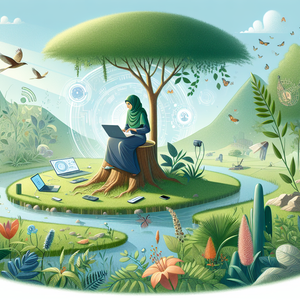The Future of Email: How Outlook is Adapting to the Remote Work Revolution

The COVID-19 pandemic accelerated a trend that was already in motion: the shift toward remote work. Organizations around the globe quickly transitioned to virtual environments, resulting in a surge in demand for effective communication tools. As teams became geographically dispersed, the need for seamless collaboration grew paramount. Email, once considered a traditional communication method, had to evolve to keep pace with modern work dynamics, ensuring that teams could maintain productivity and collaboration from anywhere.
New Features Enhancing Collaboration
In response to the challenges posed by remote work, Microsoft has introduced an array of new features in Outlook designed to enhance collaboration and streamline communication.
Integration with Microsoft Teams
One of the most significant changes in Outlook is its integration with Microsoft Teams. Users can now schedule Teams meetings directly from their Outlook calendar, facilitating smoother transitions from email discussions to virtual meetings. This feature not only saves time but ensures that all team members stay informed and engaged, regardless of their location. For instance, a project manager can send out an email to team members proposing a deadline and, with just a few clicks, convert that email discussion into a scheduled Teams meeting for further deliberation.
Shared Calendars and Resources
Outlook has also improved its shared calendar functionalities, enabling teams to manage their schedules more effectively. Remote teams can now view and manage shared calendars, making it easier to plan meetings across different time zones. Features like the 'FindTime' tool help identify optimal meeting times, significantly reducing the back-and-forth often associated with scheduling. This capability is particularly valuable for global teams, allowing them to coordinate without the usual confusion of time zone differences.
Focused Inbox
To combat the overwhelming influx of emails that remote workers often face, Outlook’s Focused Inbox feature helps users prioritize important messages. By automatically sorting emails into 'Focused' and 'Other' tabs, users can concentrate on what matters most, enhancing productivity and reducing email fatigue. This feature is particularly beneficial for professionals inundated with messages, allowing them to respond to critical communications promptly while minimizing distractions.
Future Trends in Email and Productivity Software
As Outlook continues to adapt, several trends are emerging that will shape the future of email and productivity software.
Increased Automation
The future of Outlook is likely to feature enhanced automation capabilities. With the rise of AI-powered tools, users can expect advanced features such as smart replies and automated scheduling. These functionalities will not only save time but also alleviate the cognitive load associated with managing daily communications. For example, AI could suggest quick responses based on the content of an email, allowing users to maintain engagement without manually crafting every reply.
Enhanced Security Features
As remote work proliferates, so do cybersecurity risks. Outlook is expected to implement more robust security measures, including advanced encryption and phishing detection tools. These enhancements will be essential for ensuring that sensitive information remains protected, particularly as teams work from various locations and devices. For instance, organizations can leverage Outlook's built-in security features to safeguard confidential client communications and internal data.
Integration with Other Productivity Tools
As the remote work ecosystem continues to expand, Outlook will likely broaden its integration with other productivity tools beyond Microsoft’s suite. Seamless connections with project management software, CRM systems, and collaboration platforms will become essential for maintaining workflows and communication across diverse tools. This interconnectedness will enable teams to work more efficiently, allowing for real-time updates and collaboration across different applications.
The remote work revolution has fundamentally changed how we communicate and collaborate, and Microsoft Outlook is evolving to meet these new demands. By introducing innovative features and anticipating future trends, Outlook is not just adapting to the current landscape but actively shaping the future of email and productivity. As businesses continue to navigate this new era of work, tools like Outlook will play a crucial role in fostering collaboration, enhancing productivity, and ensuring that teams can thrive in a remote environment. Embracing these changes will not only benefit individual users but also strengthen the overall fabric of organizational communication in a rapidly changing world. As we look ahead, the evolution of Outlook signals a promising future for professional communication in a digital-first world.
Remote Work Coordinator
Tech startups, remote-first companies, and organizations transitioning to hybrid work models
Core Responsibilities
Facilitate communication and collaboration among remote teams by organizing virtual meetings and workshops.
Manage and optimize the use of digital collaboration tools, including Outlook and Microsoft Teams, to enhance team productivity.
Provide support and training to employees on best practices for remote work and digital communication tools.
Required Skills
Strong understanding of remote work dynamics and digital communication platforms.
Excellent organizational and interpersonal skills.
Experience with project management tools and software integration.
Email Marketing Specialist
Marketing agencies, e-commerce companies, and organizations with a focus on digital communication
Core Responsibilities
Develop and execute email marketing campaigns that engage remote employees and clients.
Analyze open rates, click-through rates, and overall campaign effectiveness to optimize future communications.
Collaborate with design and content teams to create compelling email content and layouts.
Required Skills
Proficiency in email marketing tools (e.g., Mailchimp, HubSpot) and analytics platforms.
Strong writing and content creation skills, with an understanding of audience segmentation.
Familiarity with best practices in email deliverability and compliance (e.g., GDPR).
IT Support Specialist for Remote Tools
IT service providers, large corporations, and tech companies
Core Responsibilities
Provide technical support for remote employees using communication tools like Outlook and Microsoft Teams.
Troubleshoot and resolve issues related to software access, account management, and connectivity.
Conduct training sessions for employees on the effective use of remote collaboration tools.
Required Skills
Technical expertise in IT support and software troubleshooting.
Excellent communication skills to interact with remote users effectively.
Familiarity with remote desktop support tools and ticketing systems.
Digital Transformation Consultant
Consulting firms, large enterprises undergoing digital transformation, and tech consultancies
Core Responsibilities
Analyze and advise organizations on integrating digital tools to enhance remote work and collaboration.
Assist in the implementation of productivity software, ensuring alignment with business objectives.
Evaluate existing workflows and recommend improvements to maximize efficiency using digital platforms.
Required Skills
Strong background in business analysis and digital strategy.
Familiarity with various productivity and collaboration tools, including Microsoft 365.
Exceptional problem-solving and project management skills.
Cybersecurity Analyst for Remote Work Environments
Financial institutions, healthcare organizations, and companies with remote work policies
Core Responsibilities
Monitor and protect against cybersecurity threats in remote work settings, focusing on email and collaboration tools.
Conduct risk assessments and develop security protocols to safeguard sensitive data transmitted via platforms like Outlook.
Provide training and awareness programs for employees on cybersecurity best practices.
Required Skills
Knowledge of cybersecurity principles, threat detection, and response strategies.
Familiarity with security tools and technologies, including encryption and phishing detection.
Strong analytical skills and attention to detail.


